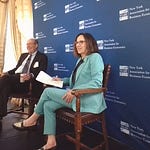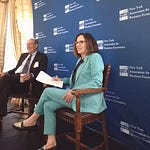The Global Financial Stability report is one of the mostly eagerly awaited reports released at the bi-annual meetings of the International Monetary Fund and World Bank. This year, at the Spring Meetings, with the recent wild swings in bonds, the weakening in the dollar, and stock market plunges around the world, anticipation of the risks and warnings the report might send has been keener than ever.
And the IMF report didn’t disappoint. “Global financial stability risks have increased significantly,” it said. “One main trigger of further selloffs could be geopgolitical risks.” No whitewashing of the facts here. Bond market volatility has been extensive and there’s no guarantee the end is in sight.
.
Enter Tobias Adrian. As Financial Counsellor and Director of the IMF’s Monetary and Capital Markets Department, he oversees the publication of the GFSR. Before he took over his job at the IMF he Prior to joining the IMF, Mr. Adrian was a Senior Vice President of the Federal Reserve Bank of New York and the Associate Director of the Research and Statistics Group. At the Federal Reserve, he contributed to monetary policy, financial stability policies, and to crisis management. No wonder that in-the-know financial market people put great stock in whatever he has to say.
When he joined me within a few hours of the report’s release, his message was clear. Yes, markets have been volatile, yes risks remain, yes the IMF team is watching this all very closely. And in spite of all this, there are no bright red flags waving to signal bond market crisis ahead as “market functioning has proceeded smoothly” and “financial markets really have played their role in terms of absorbing shocks.”
So dive in and hear, see what Tobias has to say. Whether you are a bond trader or a school teacher wondering what these market swings mean for you, he will fill you in with words, phrases and facts you can absorb and use.
Uncertainty, Divergence, and shock absorption 00:01:00:17
There are three things driving <events in this report>. So let me make three quick points. The first one is, yes, uncertainty is high. It's policy uncertainty that was already elevated back in October when we released the previous Global Financial Stability report and it has increased further. The main difference to October is that financial market volatility has now caught up. Back in October, we pointed out that there was a divergence in terms of the financial market assessment and the economic assessment, and those have converged. So. Number one, financial market volatility has increased everywhere. The second point is that the outlook has deteriorated to some degree and as a result, with volatility, higher outlook, lower, you have more downside risk. But on the other hand, market functioning has proceeded smoothly. We have seen some reduction in leverage as volatility is higher, but that has not been disorderly for the moment. And so financial markets really have played their role in terms of absorbing shocks and they have amplified shocks for someone who does not work in the bond market.
An unworried current assessment 00:03:56:09
Asset valuations were stretched in many pockets, particularly in some markets. In some sectors such as tech. Those stretched asset valuations have come off to some degree, but they are not they are not even in neutral territory at the moment. So, you know, we are not too worried about the tightening of financial conditions at the moment.
Concern about uncertainty 00:04:22:05
We are worried about the overall level of uncertainty, of course. The second thing I would point to is that we have seen slowing was across sectors and across countries to some degree. But relative to, say, the inflows into US equity markets or into bond markets globally, you know, that pullback is relatively contained for now.
So far so good: volatility did not dry up liquidity 00:05:56:02
Liquidity has deteriorated in conjunction with a rise in market volatility and that is something we always observe. But there's a strong core movement between market liquidity and volatility. But it's not it hasn't impacted market functioning for the moment. So, you know, trading has been smooth. There have been sellers and buyers. Of course, prices have readjusted, but that is the role of finance.
US Treasury market still anchors global securities pricing 00:07:18:09
Treasury market remains the the biggest and most liquid market in the world. It remains the benchmark for other securities. And, you know, it's really the trust in the resilience of the institutions in the rule of law that is at the foundation of the importance of of US capital markets and, you know, I remain confident that that that, you know, trust remains, if you like, and focused mostly on US markets.
The Global economy weathered a series of storms well 00:08:22:23
There's more action on the economic front, particularly coming out of Germany. And, you know, of course, Europe is also a benchmark in global capital markets. You know, reserve managers around the world are holding not just US assets, but also European assets, also other bonds, economy assets and more and more emerging market assets. Right. I do want to underline that many of the major emerging markets have been very resilient in the face of massive shocks of over recent years, starting with the pandemics, the high inflation episode, then the wars and, you know, the economic policy making, the strength of institutions in many emerging markets really has improved tremendously.
All of it underlined by Central Bank Independence- 00:09:53:17
we have seen again and again that central bank independence is foundational for central banks to achieve price stability goals, to ensure financial stability. So, you know, the institutional set up of central banks is at the core of our mandate at the fund. And we think that independence is important.
TOBIAS ADRIAN
Tobias Adrian is the Financial Counsellor and Director of the Monetary and Capital Markets Department of the International Monetary Fund (IMF). In this capacity, he leads the IMF’s work on financial sector surveillance, monetary and macroprudential policies, digital money, financial regulation, bank resolution, debt management, capital markets, and climate finance. He also oversees capacity building activities in IMF member countries with regard to the supervision and regulation of financial systems, bank resolution, central banking, monetary and exchange rate regimes, central bank digital currency, and debt management.
Prior to joining the IMF, Mr. Adrian was a Senior Vice President of the Federal Reserve Bank of New York and the Associate Director of the Research and Statistics Group. At the Federal Reserve, he contributed to monetary policy, financial stability policies, and to crisis management.
Mr. Adrian has published extensively in economics and finance journals. His research spans macro-finance, monetary policy, financial stability, and climate finance, with a focus on aggregate consequences of capital markets developments. He has taught at Princeton University and New York University. He is member of the editorial boards of the International Journal of Central Banking and the Annual Review of Financial Economics.
Mr. Adrian holds a Ph.D. from the Massachusetts Institute of Technology in Economics, an MSc from the London School of Economics in Econometrics and Mathematical Economics, a Diplom from Goethe University Frankfurt and a Maîtrise from Dauphine University Paris. He received his Abitur in Literature and Mathematics from Humboldtschule Bad Homburg.













Share this post